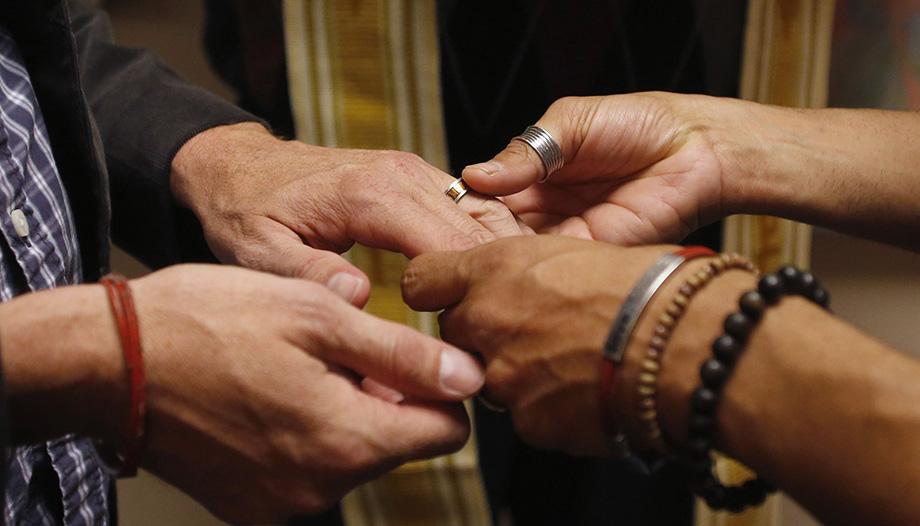In recent times, I have often been asked a question that is not easy for me to answer: "What is happening in Germany?"
It is more or less easy to record some facts, but it is difficult to weigh their significance. Recently, a group of students asked me this question after reading the media reports about the recent action in which some German priests invited the German priests to the homosexual couples who so desire to receive a blessing. The invitation was intended as a rejection of the Holy See's communication of March 25, which recalled that homosexual acts are sinful and therefore cannot be blessed. The promoters of the call had considered this response as "a slap in the face" of those who are forced to defend "their way of loving" and of pastors or theologians who "grant God's blessing in the decisive situations of life".
The day chosen for the blessings was May 10, or one close to that date, because on the Ecumenical Lexikon of Saints mentions it as dedicated to Noah, and thus recalls the alliance with man that God sealed with the sign of the rainbow, symbolized in the flag of the homosexual movement.
Complex valuation
It is difficult to make an assessment of events whose context is in complex historical, cultural and ecclesial situations. This is made much easier by direct knowledge of each country; with regard to Germany, it is fortunate to have the valuable contributions in the following areas Omnes by our correspondent in Germany, José García, who has been based there for many years; for example, in relation to this topic, it is worth reading his article in this link. Nevertheless, it may be possible to get a tentative idea of the effects of the recent blessing action.
Its promoters did not want to qualify it as a "protest", although it expressed rejection and vindication. Insofar as it was directed against the Holy See and the teaching reaffirmed by it, it can already be considered questionable. And if among those who reject this teaching it is pointed out that the supposed "rigidity" of the Church on this point of doctrine can alienate many from it, it is obvious that the same can happen when in the parish where the person who habitually practices the faith goes hangs a huge rainbow flag or the celebration of the Mass is dominated by that sign, as has been happening in recent weeks in different places.
An action without massive response
However, the effects may not have been as negative as one might think. It should be noted that the action has not had such a massive response. In the end, in the days that the action lasted there were about 100 priests throughout the country who blessed homosexual couples. Not all of them did it in parishes; there were also chaplaincies, branches, etc. And not only homosexual couples attended, but also others who wanted to show their solidarity and, as the organizers' website said, "to make visible how many people in the Church feel as an enrichment and a blessing the multiple variety of the different life projects and love stories of people".
Another fact is that, in the tense situation that is being experienced within the Church in Germany, on this occasion the President of the Bishops' Conference, Bishop Georg Bätzing, has calmed tempers, distanced himself from the convocation and thus contributed to avoiding an "escalation" in the confrontation on this particular point.
To understand why this attitude deserves appreciation, it is enough to consider that Bätzing himself was critical when the Congregation for the Doctrine of the Faith made public its response to the consultation on the possibility of blessings of this style, and pointed out the need to "develop" Catholic doctrine in this matter, "on the basis of the fundamental truths of faith and morals, of the progress of theological reflection and also of openness to the new findings of the human sciences and the situations of people today."
On this occasion, however, on April 28, he stated that he considered such public actions "not a useful sign nor do they mark the way forward," since liturgical blessings have "their own meaning and their own dignity." This is the line of prudence followed by almost all the other bishops. Possibly it was a good sign, relaxing the tension not only in view of the convocation on the 10th, but also the general climate. It does not seem that there is a desire to reach an overflow, when some have expressed their fear of a possible separation or schism.
For its part, the Synodal Way, which in various matters seems to be playing with fire, is proceeding in a contained manner, more like an attempt to propose reforms, also of content and therefore legitimate or not, but without any desire to force the tension beyond what is tolerable. Within the framework of the latter (the Synodal Way), the upcoming renewal of the presidency of the Central Committee of German CatholicsThe President, co-organizer of the process together with the Bishops' Conference, may also provide a signal for the future course of things.








